(word完整版)上海牛津英语4B知识点
上海版牛津英语4B-语法总结之一——一般现在时
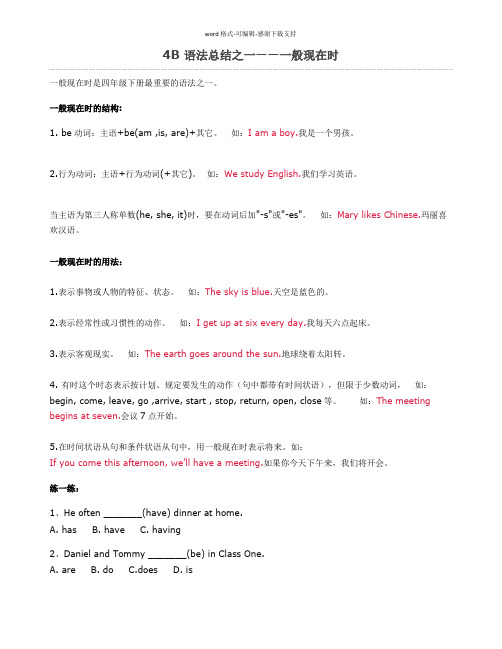
一般现在时是四年级下册最重要的语法之一。
一般现在时的结构:1. be动词:主语+be(am ,is, are)+其它。
如:I am a boy.我是一个男孩。
2.行为动词:主语+行为动词(+其它)。
如:We study English.我们学习英语。
当主语为第三人称单数(he, she, it)时,要在动词后加"-s"或"-es"。
如:Mary likes Chinese.玛丽喜欢汉语。
一般现在时的用法:1.表示事物或人物的特征、状态。
如:The sky is blue.天空是蓝色的。
2.表示经常性或习惯性的动作。
如:I get up at six every day.我每天六点起床。
3.表示客观现实。
如:The earth goes around the sun.地球绕着太阳转。
4. 有时这个时态表示按计划、规定要发生的动作(句中都带有时间状语),但限于少数动词,如:begin, come, leave, go ,arrive, start , stop, return, open, close等。
如:The meeting begins at seven.会议7点开始。
5.在时间状语从句和条件状语从句中,用一般现在时表示将来。
如:If you come this afternoon, we’ll have a meeting.如果你今天下午来,我们将开会。
练一练:1、He often _______(have) dinner at home.A. hasB. haveC. having2、Daniel and Tommy _______(be) in Class One.A. areB. doC.doesD. is3、The girl _______(teach) us English on Sundays.A. is teachingB. teachC. teachesD. teaching。
上海版牛津英语4B-语法总结之二——名词的格
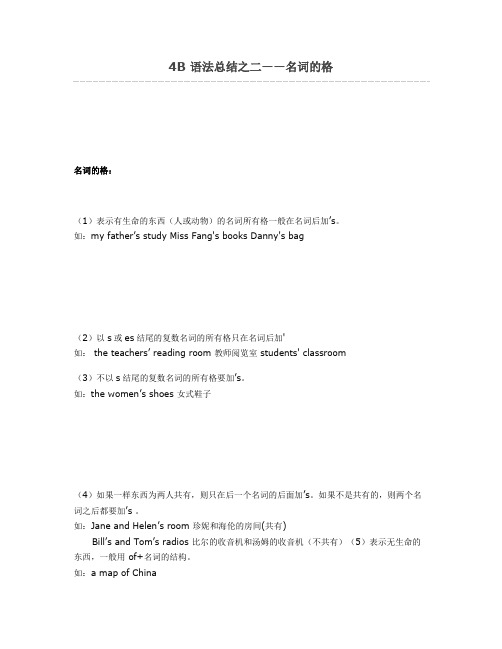
4B 语法总结之二——名词的格
名词的格:
(1)表示有生命的东西(人或动物)的名词所有格一般在名词后加’s。
如:my father’s study Miss Fang's books Danny's bag
(2)以s或es结尾的复数名词的所有格只在名词后加'
如: the teachers’ reading room 教师阅览室 students' classroom
(3)不以s结尾的复数名词的所有格要加’s。
如:the women’s shoes 女式鞋子
(4)如果一样东西为两人共有,则只在后一个名词的后面加’s。
如果不是共有的,则两个名词之后都要加’s 。
如:Jane and Helen’s room 珍妮和海伦的房间(共有)
Bill’s and Tom’s radios 比尔的收音机和汤姆的收音机(不共有)(5)表示无生命的东西,一般用 of+名词的结构。
如:a map of China。
小学牛津英语4B知识点总结
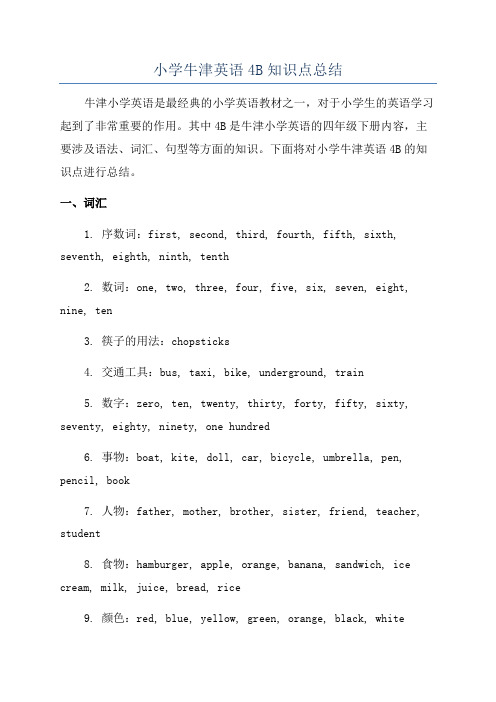
小学牛津英语4B知识点总结牛津小学英语是最经典的小学英语教材之一,对于小学生的英语学习起到了非常重要的作用。
其中4B是牛津小学英语的四年级下册内容,主要涉及语法、词汇、句型等方面的知识。
下面将对小学牛津英语4B的知识点进行总结。
一、词汇1. 序数词:first, second, third, fourth, fifth, sixth, seventh, eighth, ninth, tenth2. 数词:one, two, three, four, five, six, seven, eight, nine, ten3. 筷子的用法:chopsticks4. 交通工具:bus, taxi, bike, underground, train5. 数字:zero, ten, twenty, thirty, forty, fifty, sixty, seventy, eighty, ninety, one hundred6. 事物:boat, kite, doll, car, bicycle, umbrella, pen, pencil, book7. 人物:father, mother, brother, sister, friend, teacher, student8. 食物:hamburger, apple, orange, banana, sandwich, ice cream, milk, juice, bread, rice9. 颜色:red, blue, yellow, green, orange, black, white10. 音乐乐器:piano, violin, guitar, drums, flute11. 动物:dog, cat, monkey, panda, rabbit, bird, fish, elephant, tiger, lion12. 日期:Monday, Tuesday, Wednesday, Thursday, Friday, Saturday, Sunday二、语法1.一般现在时:主语+动词原形/第三人称单数现在时形式;e.g. I like music. He likes music.2. 物主代词:my, your, his, her, itse.g. This is my book.3.反意疑问句:陈述部分否定,疑问部分用否定的形式;陈述部分肯定,疑问部分用肯定的形式。
(完整)最新上海版牛津英语4B单词表(带音标的)
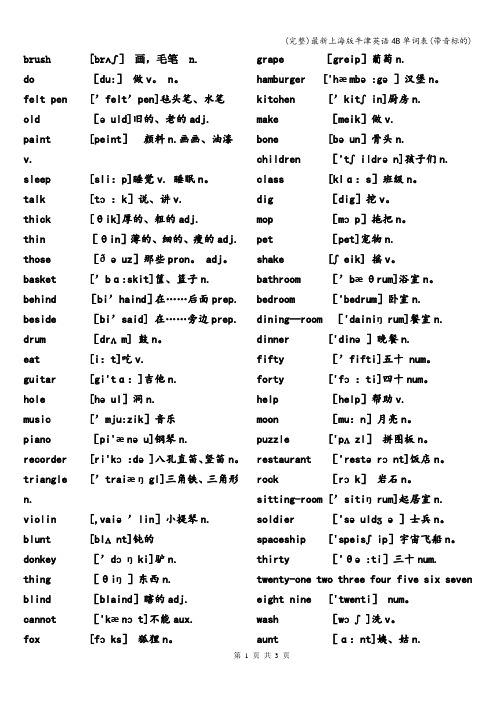
brush [brʌʃ]画,毛笔 n.do [du:]做v。
n。
felt pen [’felt’pen]毡头笔、水笔old [əuld]旧的、老的adj.paint [peint]颜料n.画画、油漆v.sleep [sli:p]睡觉v. 睡眠n。
talk [tɔ:k]说、讲v.thick [θik]厚的、粗的adj.thin [θin]薄的、细的、瘦的adj. those [ðəuz]那些pron。
adj。
basket [’bɑ:skit]筐、篮子n. behind [bi’haind]在……后面prep. beside [bi’said]在……旁边prep. drum [drʌm] 鼓n。
eat [i:t]吃v.guitar [gi'tɑ:]吉他n.hole [həul]洞n.music [’mju:zik]音乐piano [pi'ænəu]钢琴n.recorder [ri'kɔ:də]八孔直笛、竖笛n。
triangle [’traiæŋgl]三角铁、三角形n.violin [,vaiə’lin]小提琴n.blunt [blʌnt]钝的donkey [’dɔŋki]驴n.thing [θiŋ]东西n.blind [blaind]瞎的adj.cannot ['kænɔt]不能aux.fox [fɔks]狐狸n。
grape [greip]葡萄n.hamburger ['hæmbə:gə]汉堡n。
kitchen [’kitʃin]厨房n.make [meik]做v.bone [bəun]骨头n.children ['tʃildrən]孩子们n. class [klɑ:s]班级n。
dig [dig]挖v。
mop [mɔp]拖把n。
pet [pet]宠物n.shake [ʃeik] 摇v。
bathroom [’bæθrum]浴室n。
(完整word版)上海牛津英语高中考点梳理

高中考点梳理高一上单元课文考点(知识点)Unit 1 Body language复习时态一般现在时现在进行时一般将来时一般过去时现在完成时过去进行时过去完成时Unit 2 Care for hair 动词不定式做主语,表语,宾语,宾补,状语Unit 3 A taste of travel 动名词的用法(总结+doing的词汇及短语)The passive voice (被动态)Unit 4 Entertainment时间状语从句after,before,while,as,since,until ect原因状语从句because as sinc eUnit 5Think before youeat情态动词have to, must,should,ought toUnit 6 Fun foodwhich,who,whom,that引导从句who,that,which 引导从句高一下Unit 1Travellingaround China被动语态be + 动词过去分词however,but, or,unless,although,and 的用法Unit2Travellingaround the having+ 动词的过去分词形式动名词的完成式worldUnit 3Foreignlanguagelearning1.动名词的被动式和否定式being+过去分词not+动名词2.建议性说法I suggest that...It might be a good idea to...Unit 4Bodylanguage 逻辑主语+动名词作主语,宾语的用法动名词的复合结构Unit5 Music名词性从句主语从句Unit6 Movie定语从句表语从句be+从句Unit7 Newspapers同位语从句引导词一般有idea,belief,hope,news,decision,fact,trut等Unit8 Magzineit 引导的从句it 作为形式宾语高二上Unit 1 Sporting 1.目的状语events in order (not) to/so as (not) toSo that/in order thatIn case2. 让步状语despite/in spite ofAlthough/though/even thoughUnit 2Continouslearning 现在完成进行时现在完成时Unit 3Contemporarystyle限定性从句非限制性从句,which等one of whom,some of whom 的非限制性从句Unit 4 Big bussiness 过去分词表示状语(-分ed词表原因,时间,状态等)Unit 5Teconologyall around us过去分词放在名词前(ns前置定语)过去分词放在名词后(-e分d 词做形容词)比较现在分词和过去分词作形容词的用法Unit 6SpaceexplorationIf引导的从句(主将从现)其他单词或者其它短语引导的条件状语从句,引导词有as long as/unless高二下Unit 1Words andtheir stories派生词Unit 2Makingspeeches对话和复合词Unit 3 On friendshipIt +is/was+被强调的部分+that+其余部分Unit 4Amazingachievementsdo引导的强调句Unit 5GreatScientists倒装句:助动词,情态动词,系动词位于主语前出现的词:only,never,hardly,scarely,seldom,not...untilUnit6Amazingachievements 倒装句there, here, now引导的谓语动词一般是be, come, go, exist,so, neither...nor作表语的介词置于句首,谓语为be作地点状语的介词置于句首,谓语为stand,sit,hang,lieUnit7Enjoying theclassicsmust,may,might,can't/couldn't+be doing must,may,might,can't/couldn't+have done 高三上Unit1 Rearching outit作为形式主语it作为后置宾语Unit2Society andchange 方式状语as, in the same way as 结果状语so...that;such...that 与其他状语的回顾Unit3 Traveif 引导的虚拟语气if引导的从句用一般过去式,主句用would/should/might(not)+完成时(对过去的虚拟)if引导的从句用were to do sth, 主句用would/should/might(not)+一般现在时(对将来的虚拟)Unit4Familycelebrations名词性从句的虚拟语气由suggest,insist,demand,reguire,ask 等引导的宾语从句谓语动词可以用(should)+动词原形It+natual/necessary/strange/essential+that+...(should)+动词原形在同谓语从句中(引导词为suggestion,advice,proposal/idea)*Unit5A tale with atwist*unit6A wilde playfor love *Unit7The poetryof nature高三下Two被动语态复习Unit1generationsUnit2 growing up 情态动词复习Unit3 Our space 倒装句复习Space状语从句复习Unit4explorationFuture定语从句复习Unit5educationCareer名词性从句复习Unit6preparation备注:带*的课文是不重点考察的。
最新牛津上海版英语4b-m2u1
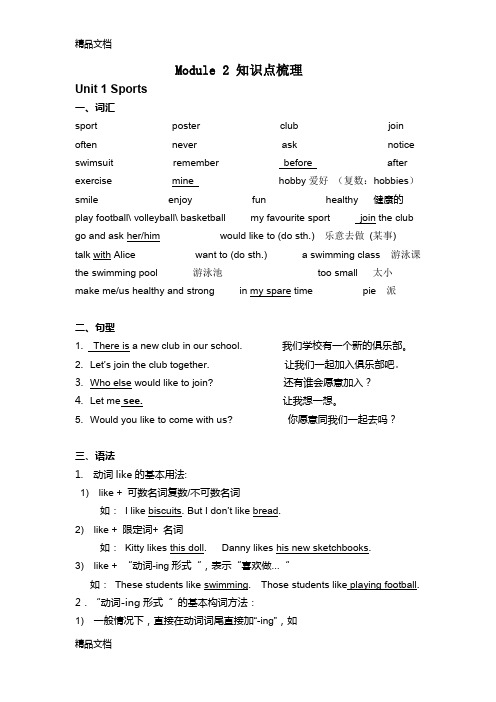
Module 2 知识点梳理Unit 1 Sports一、词汇sport poster club join often never ask notice swimsuit remember before after exercise mine hobby爱好(复数:hobbies)smile enjoy fun healthy 健康的play football\ volleyball\ basketball my favourite sport join the club go and ask her/him would like to (do sth.) 乐意去做(某事)talk with Alice want to (do sth.) a swimming class 游泳课the swimming pool 游泳池too small 太小make me/us healthy and strong in my spare time pie 派二、句型1. There is a new club in our school. 我们学校有一个新的俱乐部。
2. Let’s join the club toget her. 让我们一起加入俱乐部吧。
3.Who else would like to join? 还有谁会愿意加入?4.Let me see.让我想一想。
5. Would you like to come with us? 你愿意同我们一起去吗?三、语法1. 动词like的基本用法:1) like + 可数名词复数/不可数名词如:I like biscuits. But I don’t like bread.2) like + 限定词+ 名词如:Kitty likes this doll. Danny likes his new sketchbooks.3) like + “动词-ing形式“,表示“喜欢做…“如:These students like swimming. Those students like playing football. 2.“动词-ing形式“的基本构词方法:1) 一般情况下,直接在动词词尾直接加“-ing”,如play---- playing do----doing read-----reading 2) 以不发音的字母”-e”结尾的动词,去“-e”, 加“-ing”write----- writing make---- making ride---- riding3) 以重读闭音节动词双写词尾辅音字母,再加“-ing”run----running hop----hopping swim---swimming skip sit get 3. …like …(doing) 表示喜欢做某事读一读,下面两组句子,注意句式的变化,以及助动词do/does的正确运用1)I like playing badminton.否定句:一般疑问句:肯定/否定回答:划线提问:2)Alice like s swimming.否定句:一般疑问句:肯定/否定回答:划线提问:4. 人称代词例如:She often plays badminton with me.Let’s go and ask her. (Let’s … = Let us)Henry runs away, but the black shape follows him.四、语音/ai / -i-f i ve M i ke n i ne l i ne m i ne n i ce sm i le/ ai / -ie p ie fr ie sI .找出划线部分发音不同的词,把编号填入前面的括号内( ) 1. A. there B. deer C. hear ( ) 2. A. purse B. first C. dinner ( ) 3. A. draw B. owl C. lawn ( ) 4. A. bath B. path C. wash ( ) 5. A. noise B. tortoise C. toiletIII. Read and write (选词填空,每词只能用一次)(off, into, about, onto, of )My friend Ratty tells me a lot __________ his pet, the cat Kitty. It is brave. Sometimes it can climb __________ the door. Sometimes it can jump_________ the wall. But sometimes it is afraid _________ the dog Rex. How lovely!IV. Read and write (用所给单词的适当形式填空) 8%1. Mark likes ____________(play) with his friends.2. Do you want the green grapes or the purple _______(one)?3. I go and my shadow goes. It always ____________ ( follow ) me.4. It’s Earth Hour now. Many people turn off __________(they ) lights.5. Tom’s dog______________ ( chase ) his cat now.6. What are __________ ( that )? They are ___________. ( knife )7. Let’s go ________________ ( swim ) together.V. Read and choose(选择最佳答案填空)( ) 1. The moon ______ down in the morning. A. goes B. go C. is going( ) 2. I don’t like lemon juice ________ peach juice.. A. and B. with C. or ( ) 3. Look, Joyce is __________ a hamburger. A. drinking B. having C. has( ) 4. How ____ the cherries _______? Sweet. A. does…feel B. does…taste C. do…taste( )5. Would you like _______ the club? A. join B. to join C. joining( ) 6. —__________ toy bear is it? —Oh, it’s my cousin’s. A. Who’s B. Whose C. How( ) 7. Look at the shape. It __________ a running dog. A. likes B. is like C. would like( ) 8. Don’t _________ the babies. They are too tired and they are sleeping. A. wake up B. look back C. run after( ) 9. The blind brothers can __________ the elephant. A. watch B. see C. touch( ) 10. —Let’s go to the park and _______ a bicycle. —OK. A. riding B. to ride C. rideVI. Read and write(按要求改写句子) 5%1. The little boy is brave. (用afraid 做选择疑问句) _____ the boy brave _____ afraid?2. These are Sandy’s pencils. (对划线部分提问) ________ pencils _____ these?3. Flo likes playing volleyball. (一般疑问句) _______ Flo ________ playing volleyball?4. The dog likes eating bones. (对划线部分提问) ______ does the dog like________?5. Grandpa is washing some toys. (改成否定句) Grandpa ______ washing_______ toys.VII. Reading comprehension(阅读理解) 10%A. Cloze (首字母填空) 5%B. This is Mr. Baker's family. There are four people in it. They're Mr. Baker,Mrs. Baker, their son Henry and their daughter Helen. Henry and Helen are in the same school. Now it's seven o’clock in the evening. Mr. Baker wearsa pair of g_________. He's reading a book. He’s in t he l___________ room.Mrs. Baker is doing some washing in the b___________. Helen is doing her homework in the b__________. And Henry is making a m__________ ship. They are happy.C. B. Read and choose(阅读短文,选择最佳答案) 5%D. Hello, I’m Tom. I’m a school boy. I li ke sports very much. I do sports everyday. After school on Monday, I go running with some friends for about an hour. It’s my favourite sport. On Tuesday, I like to swim in the swimming pool with Tim. He can swim very well. On Wednesday, I play football atschool with my classmates. Peter likes playing it best. And on Thursday afternoon, I play table tennis with Mike. He is good at playing table tennis.He always win me. When Friday comes, I enjoy playing volleyball on the school playground with Mark. But I can’t play it very well. When Saturday and Sunday come, I call them ‘Holidays’. I do my favourite ‘sport’—sleeping.How happy I am! 1. ___________ likes playing football best. 2.___________can play table tennis well. 3. ___________likes to run after school with some friends. 4. ___________ likes playing volleyball verymuch. 5. __________ is good at swimming. VIII. Write:(根据所给题目写一段不少于50 字的短文。
(完整版)小学牛津英语4B书后单词表
U1U1
[kraɪ]
v.哭
cry
M3U1
[kju:t]
adj.可爱的
cute
M2U2
D
[dɪə(r)]
n.鹿
deer
M1U3
[ˈdɪnə(r)]
n.主餐,正餐
dinner
M2U3
狗粮
dog food
M2U2
[ˈdɔ:bel]
n.门铃
doorbell
M3U1
[daʊn]
adv.向下,朝下prep.沿着
n.葡萄
grape
M1U1
[grəʊ]
v.变得
grow
M1U3
H
七点半
half past seven
M3U2
[hɑ:d]
adj.硬的
hard
M1U2
洗澡
have a both
M3U1
玩得高兴
have a good time
M3U3
度假
have a holiday
M2U3
看一看
have a look
M2U3
n.活动
activity
M3U3
[əˈgen]
adv.又;再
again
M1U3
[ɔ:l]
pron.所有;全体
all
M1U2
一路上;自始至终
all the way
M3U2
[ˈɔ:lsəʊ]
adv.也
also
M1U3
[ˈɔ:lweɪz]
adv.总是
always
M3U3
[ˈæŋgri]
adj.生气的
angry
M2U2
上海版牛津英语4B单词(含音标)与短语整理
4B-M1-单词汇之阳早格格创做闻smell[smel]品尝taste[teɪst]大概者;仍旧or[ɔː]果汁juice[dʒuːs]猜guess[ges]紫色的purple['pɜːp(ə)l]精确的;左边right[raɪt]认为think[θɪŋk]西瓜watermelon['wɔːtəmelən]葡萄grape[greɪp]李子;梅子plum[plʌm]樱桃cherry['tʃerɪ]樱桃(复)cherries草莓strawberry['strɔːb(ə)rɪ]草莓(复)strawberries桃子peach[piːtʃ]桃子(复)peaches火果fruit[fruːt]坚坚的crunchy['krʌntʃɪ]狐狸fox[fɒks]狐狸(复)foxes圆的round[raʊnd]那些these[ðiːz]那些those[ðəʊz]葡萄藤vine[vaɪn]酸的sour[saʊə]时常often['ɒf(tə)n]盘绕around[ə'raʊnd]欣赏;享受enjoy[ɪn'dʒɒɪ]内里inside[ɪn'saɪd]表里outside[aʊt'saɪd]汽车car[kɑː]公园park[pɑːk]蓝色的blue[bluː]书籍院school[skuːl]院子yard[jɑːd]也also['ɔːlsəʊ]从没有never['nevə]当...的时间when[wɛn]谁的whose[huːz]小刀knife[naɪf]小刀(复)knives尖钝的sharp[ʃɑːp]钝的blunt[blʌnt]硬的hard[hɑːd]硬的soft[sɒft]细糙的rough[rʌf]光润的smooth[smuːð]薄的thick[θɪk]薄的thin[θɪn]摸touch[tʌtʃ]事务;物品thing[θɪŋ]感觉feel[fiːl]沙滩beach[biːtʃ]女母亲parent['peər(ə)nt]沙子sand[sænd]哎哟ouch[aʊtʃ]某事;某物something['sʌmθɪŋ]钥匙key[kiː]拾得;拾得lost[lɒst]财产property['prɒpətɪ]盲的blind[blaɪnd]正在...底下under['ʌndə]三者大概以上皆all[ɔːl]男人man[mæn]男人(复)men[men]问ask[ɑːsk]回问answer['ɑːnsə]知讲know[nəʊ]另一another[ə'nʌðə]终尾的last[lɑːst]饮料drink[drɪŋk]短裙skirt[skɜːt]脚提包purse[pɜːs]天板floor[flɔː]年少的young[jʌŋ]苗条的slim[slɪm]购buy[baɪ]刚刚佳;正佳just[dʒʌst]小山hill[hɪl]影子shadow['ʃædəʊ]少凳bench[ben(t)ʃ]草坪lawn[lɔːn]小路path[pɑːθ]山mountain[ˈmaʊntən]降起rise[raɪz]死少grow[grəʊ]又一次again[ə'gen; ə'geɪn]粘揭stick[stɪk]收光shine[ʃaɪn]脚电筒torch[tɔːtʃ]形状shape[ʃeɪp]偶尔间sometimes['sʌmtaɪmz]咬bite[baɪt]跟随follow['fɒləʊ]等待wait[weɪt]停行stop[stɒp]小鹿deer[dɪə]眼泪tear[ˈtɪə]突然suddenly['sʌd(ə)nlɪ]降下fall[fɔːl]哭cry[kraɪ]害怕fear[fɪə]以至even['iːv(ə)n]啤酒beer[bɪə]惊吓scare[skeə]突然爆收burst[bɜːst]4B-M1-词汇组一杯桃子汁 a glass of peach juice 兄弟中的一人one of the brothers正在爱丽丝的家里at Alice's home 念要(干某事)want to do sth.正在一根下的藤上on a tall vine 太小了too small 一面也没有not...at all 正在中午at noon正在夏天in summer 降下go down正在阴朗的下午on sunny afternoons 变短grow short 笔袋pencil case 待正在尔后里stay behind me正在沙滩上走路walk on the beach 正在尔前里in front of me脱掉尔的鞋子take off my shoes 关上go off正在那边over there 没有再not...any more正在那女的男人the man ouver there 突然哭起去burst into tears 把...戴到...take ... to ... 沿着路走;集步walk down the road 得物招收处the lost-property office 像...一般be like4B-M1-句子您喜欢白色的仍旧绿色的?Do you like red ones or green ones?白色的苹果尝起去怎么样?How does the red apple taste?黄色的梨怎么样?How about the yellow pears?如许佳的葡萄啊!尔念要它们.What nice grapes! I want them.那是谁的笔?它是丹僧的.Whose pen is this? It's Danny's.那些书籍是谁的?它们是圆教授的.Whose books are those? They're Miss Fang's.球摸起去感觉怎么样?它又硬又光润.How does the ball feel? It's soft and smooth.是的,您天然不妨.Yes, of course you can.怎么了?What's the matter?一个骑着大象的男人去了.(2个句型)Here comes a man on an elephant.A man on an elephant comes here.剪启他们.Cut them out. 4B-M2-单词汇体育疏通sport[spɔ:t]海报poster['pəʊstə]俱乐部club[klʌb]最喜欢的favourite['feɪv(ə)rɪt]羽毛球badminton['bædmɪnt(ə)n]加进join[dʒɒɪn]所有together[tə'geðə]其余的else[els]太棒了great[greɪt]足球football['fʊtbɔːl]排球volleyball['vɒlɪbɔːl]篮球basketball['bɑːskɪtbɔːl]乒乓球table tennis['teɪb(ə)l'tenɪs]道话talk[tɔːk]天然sure[ʃɔ:(r)]泳衣swimsuit['swɪmsuːt]帽子cap[kæp]护目镜goggles[ˈgɒglz]记着remember[rɪ'membə]正在...之前before[bɪ'fɔː]正在...之后after['ɑːftə]健壮的healthy['helθɪ]您自己yourself[jɔː'self]需要need[niːd]快乐喜爱hobby['hɒbɪ]空闲的spare[speə]微笑smile[smaɪl]薯条French fries[fren(t)ʃ] [fraɪz]可爱的cute[kjuːt]食物food[fuːd]碗bowl[bəʊl]骨头hone[həʊn]肉meat[miːt]大的large[lɑːdʒ]猫粮cat food[kæt][fuːd]鹦鹉parrot['pærət]鱼,鱼肉fish[fɪʃ]狗粮dog food[dɒg][fuːd]黑龟tortoise['tɔːtəs]摇shake[ʃeɪk]篮子basket['bɑːskɪt]抓住catch[kætʃ]洞hole[həʊl]动物animal['ænɪm(ə)l]兽医vet[vet]辱物pet[pet]爱love[lʌv]加add[æd]戴去take[teɪk]戴去(过)took[tʊk]教teach[tiːtʃ]教(过)taught[tɔːt]土司toast[təʊst]足趾toe[təʊ]小船boat[bəʊt]山羊goat[gəʊt]数教maths[mæθs]营天camp[kæmp]死计life[laɪf]家庭做业homework['həʊmwɜːk]客厅living room['lɪvɪŋ ruːm]卧室bedroom['bedruːm]浴室bathroom['bɑːθruːm]模型model['mɒdl]洗wash[wɒʃ]早餐dinner['dɪnə]厨房kitchen['kɪtʃɪn]天球earth[ɜːθ]灯light[laɪt]小时hour['aʊə]常常usually[ˈjuːʒʊəlɪ]报告tell[tel]睡眠时间bedtime['bedtaɪm]故事书籍storybook['stɔːrɪbʊk]幻念的fairy['feərɪ]传道tale[teɪl]闲道chat[tʃæt]有趣的interesting['ɪnt(ə)rɪstɪŋ]他们自己themselves[ð(ə)m'selvz]假期holiday['hɒlɪdeɪ]贝壳sell[sel]沙子sand[sænd]响明的loud[laʊd]声音voice[laʊd]噪音noise[laʊd]仍旧still[stɪl]4B-M2-词汇组干热身疏通do warm-up exercises 干一个飞机模型make a model plane 游泳池swimming pool 干饭cook dinner 恣意享受enjoy yourself 天球一小时Earth Hour 业余时间spare time 关关turn off 一大碗猫粮 a large bowl of cat food 瞅一瞅have a look 每天every day 瞅电视watch TV降下fall down 正在深夜at night醉wake up 童话故事fairy tale 爬上一扇门climb onto a door 许多 a lot of 遁走run away 寒假summer holiday 跳下jump off 正在何处over there回到go back to 去游泳go swimming干某人的回家做业do one's homework4B-M2-句子尔也是.Me too.您念加进咱们吗?Would you like to come with us?让尔念念.Let me see.哦,天然了.尔承诺.Oh, sure. I'd love to.4B-M3-单词汇声音sound[saʊnd]喧华的noisy[ˈnɔɪzɪ]门铃doorbell['dɔːbel]响起铃声ring[rɪŋ]电视television(TV)[ˈtelɪvɪʒn]宁静的quiet['kwaɪət]响明的loud[laʊd]铃bell[bel]风铃wind-bell['wind,bel]卡片card[kɑːd]蜡笔crayon[ˈkreɪən]细绳string[strɪŋ]小竹签stick[stɪk]分歧的different[ˈdɪfrənt]每一个each[iːtʃ]系上tie[taɪ]挨盹女,小睡doze[dəʊz]女士lady['leɪdɪ]女士(复)ladies['leɪdɪz]小睡,挨盹nap[næp]拼图游戏puzzle['pʌzl]迷惘没有解的puzzled['pʌzld]正在…中间by[baɪ]歌直song[sɒŋ]醉着的awake[ə'weɪk]星期week[wiːk]没有下兴unhappy[ʌn'hæpɪ]车轮wheel[wiːl]正圆形square[skweə]熊bear[beə]头收hair[heə]一半half[hɑːf]超出past[pɑːst] 1/4,一刻钟quarter['kwɔːtə]刷brush[brʌʃ]早退late[leɪt]…面钟o’clock[əˈklɒk]早饭breakfast['brekfəst]完毕finish['fɪnɪʃ]卡通cartoon[kɑː'tuːn]来日诰日tomorrow[tə'mɒrəʊ]沙收sofa['səʊfə]电池battery['bætri]启初start[stɑːt]离启leave[liːv]停行(往日式)stopped[stɒpt]老鼠mouse[maʊs]猫头鹰owl[aʊl]直腰bow[baʊ]星期week[wiːk]闲碌busy['bɪzɪ]周日Sunday[ˈsʌndeɪ]周一Monday[ˈmʌndeɪ]周两Tuesday['tjuːzdeɪ]周三Wednesday[ˈwenzdɪ]周四Thursday['θɜːzdeɪ]周五Friday[ˈfraɪde]周六Saturday[ˈsætədɪ]经常always[ˈɔ:lweɪz]常常usually[ˈjuːʒʊəlɪ]时常often['ɒf(tə)n]偶尔间sometimes['sʌmtaɪmz]从没有never['nevə]象棋Chinese chess从…去from[frɒm]音乐music['mjuːzɪk]中间middle['mɪd(ə)l]智慧的clever['klevə]的确really['rɪəlɪ]含羞的shy[ʃaɪ]然而while[waɪl]友擅的kind[kaɪnd]每部分everyone['evrɪwʌn]聚会meeting['miːtɪŋ]扮演show[ʃəʊ]日期date[deɪt]4B-M3-词汇组瞅电视watch TV战某人道话talk to sb.一副剪刀 a pair of scissors一路跑去书籍院run all the way to school 挨扰一下!Excuse me!醉wake up留神!Be careful!离启家leave home请宁静!Be quiet!第两天早朝the next morning 洗澡have a bath上教早退be late for school 飞走fly away今天早上last night小睡一会have a nap完毕某事finish doing sth …走近…go near从周一到周五from Monday to Friday 起床get up象棋俱乐部Chinese chess club 刷某人的牙brush one’s teeth正在周终at weekends洗某人的脸wash one’s face玩得下兴have a good time吃早饭have breakfast 多暂一次(问频次)how often干某人的回家做业do one’s homework正在周五下午on Friday afternoon 吃早饭have dinner正在周一on Monday 下班回家back home from work瞅一场影戏see a film 玩拼图do a puzzle启会have a meeting 4B-M3-句子当前是上床睡眠的时间了It’s time for bed.It’s time to go to bed.当前是上教时间了.It’s time for school.It’s time to go to school.4B-M4-单词汇钢琴piano[pɪ'ænəʊ]小提琴violin[ˌvaɪəˈlɪn]三角铁triangle['traɪæŋg(ə)l]饱drum[drʌm]吹笛子的人piper['paɪpə]皆会city['sɪtɪ]金子gold[gəʊld]音乐的musical['mjuːzɪk(ə)l]器instrument['ɪnstrʊm(ə)nt]节日festival[ˈfestəvl]华夏China[ˈtʃaɪnə]正在…功夫during['djʊərɪŋ]亲戚relative['relətɪv]饺子dumpling['dʌmplɪŋ]哪一个which[wɪtʃ]月饼mooncake['mu:nkeɪk]教习learn[lɜːn]棒,佳great[greɪt]要害的important[ɪm'pɔːt(ə)nt]保守的traditional[trə'dɪʃ(ə)n(ə)l]前夜eve[iːv]钱money['mʌnɪ]疑启envelope['envələʊp]色彩绮丽的colourful[ˈkʌlə(r)fl]烟火firework['faɪəwɜːk]特殊的special['speʃ(ə)l]记着remember[rɪ'membə]礼仪manner['mænə]使用use[juːz]叉子blow[bləʊ]吹,泡泡bubble['bʌb(ə)l]规矩polite[pə'laɪt]角逐race[reɪs]小鸭子duckling['dʌklɪŋ]天鹅swan[swɒn]巢,窝nest[nest]婴女baby['beɪbɪ]婴女(复)babies['bebɪz]鸭妈妈Mother Duck第四fourth[fɔːθ]灰色的grey[greɪ]丑恶陋的ugly['ʌglɪ]喂feed[fiːd]蠕虫worm[wɜːm]后背back[bæk]沉的heavy['hevɪ]孤独的lonely['ləʊnlɪ]女人woman['wʊmən]女人(复)women['wɪmɪn]4B-M4-词汇组弹钢琴play the piano正在新年前夜on New Year’s Eve 玩一个猜迷游戏play a guessing game得到钱get money 充谦…be full of龙舟角逐dragon boat race 给某人某物give sb sth= give sth to sb正在秋天in spring 音乐器具musical instrument干窝make a nest 橡皮筋rubber band用…喂…feed… with 秋节the Spring Festival它们所有的all of them 端午节the Dragon Boat Festival游走了swim away 中秋节Mid-autumn Festival走进一幢房子go into a house 沉阳节the Double Ninth Festival赶走drive… away 粽子rice dumpling正在草里in the grass 四3班Class 3 Grade 4往池塘里瞅look into the pond 秋节Chinese New Year。
上海版牛津英语(4B)
上海版《牛津英语(4B)》 M1 U4 复习简案提纲:课本后《练习册》P9—10:一、单词:1、食物类名词词组3个:a fish, a biscuit, an apple2、饮料类名词、名词词组5个:apple juice, lemon juice.3、orange juice. pineapple juice, water4、动词4个:smell, taste, see, like5、Be动词2个:is, am6、Be动词否定形式1个:isn ’ t7、情态动词1个:can8、情态动词否定式1个:can ’ t9、助动词1个:do10、助动词否定形式1个:don ’ t11、形容词10个:nice, blind, small—big, hard—soft,rough—mooth, blunt—sharp12、人称代词3个:I, you, it明确类别,开始口拼、记忆、翻译,组长听背、签字,完成练习题,最后积累本上写下来。
二、句子:1、陈述句8 类8句(下划线表示可以替换):I can taste . (肯定陈述句)I can smell a biscuit / an apple . (肯定陈述句)I can ’ t see . (否定陈述句)I like apple juice . (肯定陈述句)I don ’ t like apple juice . (否定陈述句)I am blind . (肯定陈述句)It is nice / small . (肯定陈述句)It isn ’ t nice . (否定陈述句)2、特殊疑问句及其回答1组:What do you like ? (特殊疑问句)I like orange juice . (肯定回答)明确类别,开始熟读、记忆、翻译,组长听背、签字,完成练习题,积累本写下来。
上海版《牛津英语(4B)》M1U3 复习简案提纲:课本后《练习册》P6—8:一、单词:1、名词词组11个:the donkey, its tail, a ruler, a rubber, a pencil,a balloon, the desk, the chair, the bag, the bear, the rabbit2、动词、动词词组3个:feel, see, put on4、Be动词缩写式1个:it’s / It’s (句子开头大写)5、情态动词1个:can6、形容词8个:small—big, hard—soft, rough—mooth,blunt—sharp7、介词3个:in, on, under8、物主代词1个:it’s“它的”(和it’s “它是” 是同音词)明确、理解类别,开始口拼、记忆、翻译,组长听背、签字,完成练习题,最后积累本上写下来。
上海牛津英语4B知识点培训资料
M1U1 What can you smell and taste?1. 词汇:watermelon西瓜grape 葡萄plum李子cherry樱桃strawberry草莓guess 猜purple紫色的smell闻taste尝sweet甜的fruit水果crunchy易碎的vine藤sour 酸的summer夏天2. 词组:a glass of watermelon juice 一杯西瓜汁smell it 闻闻它I think 我觉得close your eyes闭上你的眼睛sweet and nice又甜又美味How about---? ---怎么样?on a tall vine 在一条高藤上3. 句型:-----What do you have?-----Close your eyes. Smell it. Is it ---or---?-----I t’s....... , I think.-----Now taste it. How does it taste?-----It’s......-----What is it?-----It’s......What do you like?你喜欢什么?Do you like red ones or green ones?你喜欢红色的还是绿色的?A red apple for you and a green apple for me.一个红苹果给你, 一个青苹果给我How does the red apple taste?那个红苹果尝起来如何?What nice grapes!多美味的葡萄啊!They are not sweet at all.它们根本不甜.M1U2 How does it feel?一单词:soft 柔软的hard坚硬的rough粗糙的smooth光滑的sharp锋利的blunt钝的,迟钝的thick厚的thin薄的whose谁的these 这些those那些toy bear玩具熊touch触摸round 圆的beach海滩sand沙子blind 盲的hear 听到answer回答hot 热的cold冷的二短语:So thick这么厚put your pen in the bag把你的笔放在书包里big and round又大又圆smooth and soft光滑柔软Take off my shoes脱掉鞋子of course 当然In the sand在沙子里one of the brothers兄弟们之一take it to the lost-property office带到失物招领处touch the elephant触摸大象the last brother 最后一个兄弟play in the school yard在校园里玩三句型:1. ---Whose.....is this\ that? ---It’s.....2. ---Whose.....are these\ those? ---They are.....2.How does it feel? 它感觉怎么样?3.What’s the matter? 怎么了?4.There’s something in the sand. 沙子里有东西。
- 1、下载文档前请自行甄别文档内容的完整性,平台不提供额外的编辑、内容补充、找答案等附加服务。
- 2、"仅部分预览"的文档,不可在线预览部分如存在完整性等问题,可反馈申请退款(可完整预览的文档不适用该条件!)。
- 3、如文档侵犯您的权益,请联系客服反馈,我们会尽快为您处理(人工客服工作时间:9:00-18:30)。
(word完整版)上海牛津英语4B知识点M1U1What can you smell and taste?1.词汇:watermelon西瓜grape葡萄plum李子Cherry樱桃strawberry草莓guess猜Purple紫色的smell闻taste尝Sweet甜的fruit水果crunchy易碎的Vine藤sour酸的summer 夏天2.词组:a glass of watermelon juice一杯西瓜汁smell it闻闻它I think我觉得close your eyes闭上你的眼睛Sweet and nice又甜又美味How about---? ---怎么样?On a tall vine在一条高藤上3.句型:-----What do you have?-----Close your eyes. Smell it. Is it ---or---?-----it’s , I think.-----Now taste it. How does it taste?-----It’s ---------What is it?-----It’s----What do you like?你喜欢什么?Do you like red ones or green ones?你喜欢红色的还是绿色的?A red apple for you and a green apple for me.一个红苹果给你,一个青苹果给我How does the red apple taste?那个红苹果尝起来如何?What nice grapes!多美味的葡萄啊!They are not sweet at all.它们根本不甜.M1U2How does it feel?一单词:Soft柔软的hard坚硬的rough粗糙的smooth光滑的Sharp锋利的blunt钝的,迟钝的thick厚的thin薄的Whose谁的these这些those那些toy bear玩具熊Touch触摸round圆的beach海滩sand沙子Blind盲的hear听到answer回答hot热的Cold冷的二短语:So thick这么厚put your pen in the bag把你的笔放在书包里Big and round又大又圆smooth and soft光滑柔软Take off my shoes脱掉鞋子of course当然In the sand在沙子里one of the brothers兄弟们之一take it to the lost-property office带到失物招领处touch the elephant触摸大象the last brother最后一个兄弟play in the school yard在校园里玩三句型:1. ---Whose----is this\ that? ---It’s------Whose--- are these\ those? ---They are---2.How does it feel?它感觉怎么样?3.What’s the matter?怎么了?4.There is something in the sand.沙子里有东西.5.Here comes a man on an elephant.有一个人骑着大象走过来.6.I like eating and drinking.我喜欢吃喝M1U3 Look at the shadow!一单词:hill小山lawn草地path小路bench长凳rise升起shadow阴影high高的again再,又paint画cut剪stick 贴sometimes有时grow长成,变得beautiful漂亮的soound声音behind在----后面bite咬fast快的follow跟随together一起stop 停止afraid害怕二短语Look at看--- in the morning在上午Rise behind the hill在小山后升起On the lawn在草地上in the sky在天空中Grow short变短on the bench在长凳上Go down in the evening晚上落下on the path在小路上Cut them out把它们剪出at noon在中午Also my friend也是我的朋友stay behind me呆在我后面Walk in front of me在我前面走walk down the road沿着马路走Hear a sound 听到一个声音look back朝后看See a black shape看到一个黑影don’t bite me不要咬我Be afraid害怕run away跑掉Follow him跟着他like his new friend喜欢他的新朋友Play with it和他一起玩三句型:1. You are like me你很像我2. Let’s play together.让我们一起玩3. He is not afraid now.他现在不害怕了.M2U1 Sports一单词:Play football踢足球play table tennis打乒乓球Play volleyball 打排球play badminton打羽毛球Play basketball打篮球poster海报Club俱乐部favourite最喜爱的Join加入never从不Swimsuit泳装swimming cap泳帽Warm-up热身exercise运动Before在—之前clean清洗Healthy健康的strong强壮的Spare空闲的hobby兴趣爱好二短语:A badminton club一个羽毛球俱乐部my favourite sport我最喜欢的运动Me too我也是join the club together一起加入俱乐部Who else其他的谁would like to do想要做某事Let me see让我看看play badminton with me跟我一起打羽毛球Talk with与某人谈话in the classroom在教室里Come with us和我们一起来never play badminton从不打羽毛球Cannot be too long or too small不能太长也不能太小A pair of swimming goggles一副游泳镜get in your eyes进入你的眼睛Do warm-up exercises做热身运动go into the water入水Make you healthy and strong使你健康强壮in my spare time在我的空余时间三句型:1. ---Does—like---(doing)?---Yes,---does.No,---doesn’t.2. Who else would like to join?其他还有谁想加入?3. There is a badminton club in our school.在我们学校有个羽毛球俱乐部.4. Enjoy yourself in the swimming class!在游泳课上过得愉快!M2U2 Cute animals一单词:Bone骨头cat food猫粮parrot鹦鹉fish鱼Dog food狗粮tortoise乌龟cute较小可爱的large大的Bowl 碗meat肉shake摇leave叶子Mouse老鼠hungry饥饿的climb爬fat肥胖的Jump跳tired 劳累的catch捉住hole洞二短语:A large bowl of cat food一大碗猫食smell nice闻起来不错See an apple on the tree看到树上一只苹果Fall down倒下sleep in his basket睡在它的篮子里Wake up醒过来run away 跑开Climb onto a door爬到一扇门上jump off the door从门上跳下来Go back to his hole回到它的洞里be angry生气的三句型:1. How about Sam? Sam怎么样?2. He doesn’t eat dog food at all .它根本不吃狗粮.3. What animals do you like ?你喜欢什么动物?M2U3 Home life一单词:Bedroom卧室living room起居室bathroom浴间Kitchen厨房wash洗cook煮,烹调Star星星tell告诉storybook故事书Bedtime休息时间chat聊天interesting 有趣的Holiday假期shell贝壳二短语in the living room在起居室chat with my parents和父母聊天do my homework做家庭作业make a model plane制作飞机模型wash my hair 洗头发cook dinner煮晚餐turn off the lights关灯have a look看一看watch TV with my parents和父母一起看电视at night在夜晚look at the stars看着星星tell me a lot about 告诉我很多关于---tell us a fairy tale为我们讲一则童话故事a lot of interesting stories许多有趣的故事have a holiday在度假play beach ball over there在那玩沙滩球三句型:1. What are they doing now?他们在干什么?2. They are telling us a lot of stories about themselves.他们正在为我们讲许多关于他们自己的故事3. What a beautiful beach!多漂亮的海滩啊!4.现在进行时Module3 Unit1 Sounds1.Be doing正在做某事2.noisy吵的;有噪音的3.outside在外面4.loud大声的5.quiet安静的6.bell- doorbell- wind-bell铃;门铃;风铃7.television-TV电视机8.a thick card一张厚纸板9.crayons蜡笔10.string(uncountable)绳子11.a pair of scissors一把剪刀12.excuse me不好意思;打扰一下13.hear sth.听见·······14.too quite/loud太安静/太吵闹15.be careful小心;仔细16.be in front of在······的前面17.doze打盹18.on the bench在长凳上19.be awake醒来20.be puzzled困惑的21.live by住在···边上22.pond池塘23.have a bath洗澡24.sing songs唱歌25.old tortoise老乌龟26.fly away飞走27.have a nap打个盹28.in the end最终,最后Module3 Unit2 Time1.get up起床2.brush-brushing teeth刷牙3.have-having breakfast吃早餐4.a quarter to /past5.o’clock·······点6.be late迟到7.half past····点半8.wash face洗脸9.Friday evening周五晚10.Let’s have dinner我们吃饭吧。
